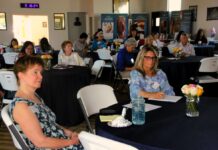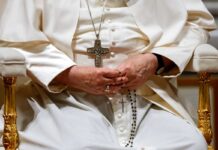BISMARCK, N.D. (CNS) — A personhood bill that defines life as starting at conception passed the North Dakota House March 22 in a 57-35 vote.
The state Senate in February approved the measure to outlaw abortion in the state. The House’s action now sends it to the desk of Gov. Jack Dalrymple for his signature. The Associated Press said he has not indicated whether he will sign it.
Passage of the personhood bill follows the Senate’s passage March 15 of a bill to ban abortions for the purpose of sex selection or genetic abnormality and another bill to ban abortion after the detection of a fetal heartbeat, which could be as early as six weeks.
Those bills already were approved by the House and also have been sent to Dalrymple.
In a statement about the fetal heartbeat and sex-selection bills, the North Dakota Catholic Conference urged the governor to sign the measures. By late in the day March 22, the conference had not yet issued a statement on the personhood bill.
After a failed attempt to strip the genetic abnormality portion from H.B. 1305, the Senate passed the bill 27-15. H.B. 1456, the fetal heartbeat bill, passed 26-17 with no debate.
The bill to prohibit abortions when the heartbeat of the unborn child is detected “does raise some new legal questions,” but the questions are without merit, said Christopher T. Dodson, executive director of the Catholic conference.
“Currently, the U.S. Supreme Court only allows states to protect unborn life after the point of viability, which is when an unborn child can survive outside the womb,” he said in March 12 testimony before the Senate Judiciary Committee.
“The Supreme Court chose viability because it understood viability to be a significant marker of human development. Close reflection, however, reveals that viability is not a measure of human development,” he continued.
“A heartbeat, however, is a marker that actually reflects the development of the unborn child. It is wrong that the courts will only allow states to protect some unborn children and not all of them,” Dodson said. “However, if the courts insist on only allowing protections for unborn children that are developed to a certain extent, the existence of a heartbeat provides a better basis than viability.”
H.B. 1456 does not specify the time frame when a fetal heartbeat can be detected, but medical experts say it occurs about six to seven weeks into a pregnancy. The measure allows abortion to save the life of the mother but prohibits it in the cases of rape or incest.
If the bill becomes law, physicians would be prosecuted for violating it, not the woman who has an abortion. If convicted a doctor could face a fine of $5,000 and a maximum sentence of five years in prison. Doctors also could lose their medical license.
Opponents say if the bill becomes law they will fight it with a legal challenge.
The American Civil Liberties Union urged Dalrymple to veto the fetal heartbeat bill, which it called “dangerous.” It said “this complex and deeply personal decision (be taken) out of the hands of politicians, and put it back in the hands of a woman, her family and her doctor where it belongs.”
The Prenatal Nondiscrimination Act, or H.B. 1305, bans abortions for the purpose of sex selection or genetic abnormality.
The North Dakota Catholic Conference in a statement said the bill furthered “several important public interests that form the basis of a civil society.”
“No matter where a person stands on abortion, we should, as a society, agree that abortion should never be used as a tool for sex-selection or the elimination of children with genetic abnormalities,” the conference statement said.
“Sex-selection abortion has drastic effects on society. An estimated 163 million girls are missing in the world because of sex-selection abortions,” it said, adding that these kinds of abortions are “not limited to other countries.”
“Several studies have documented the practice of sex-selection abortions in the United States and Canada,” it added.






